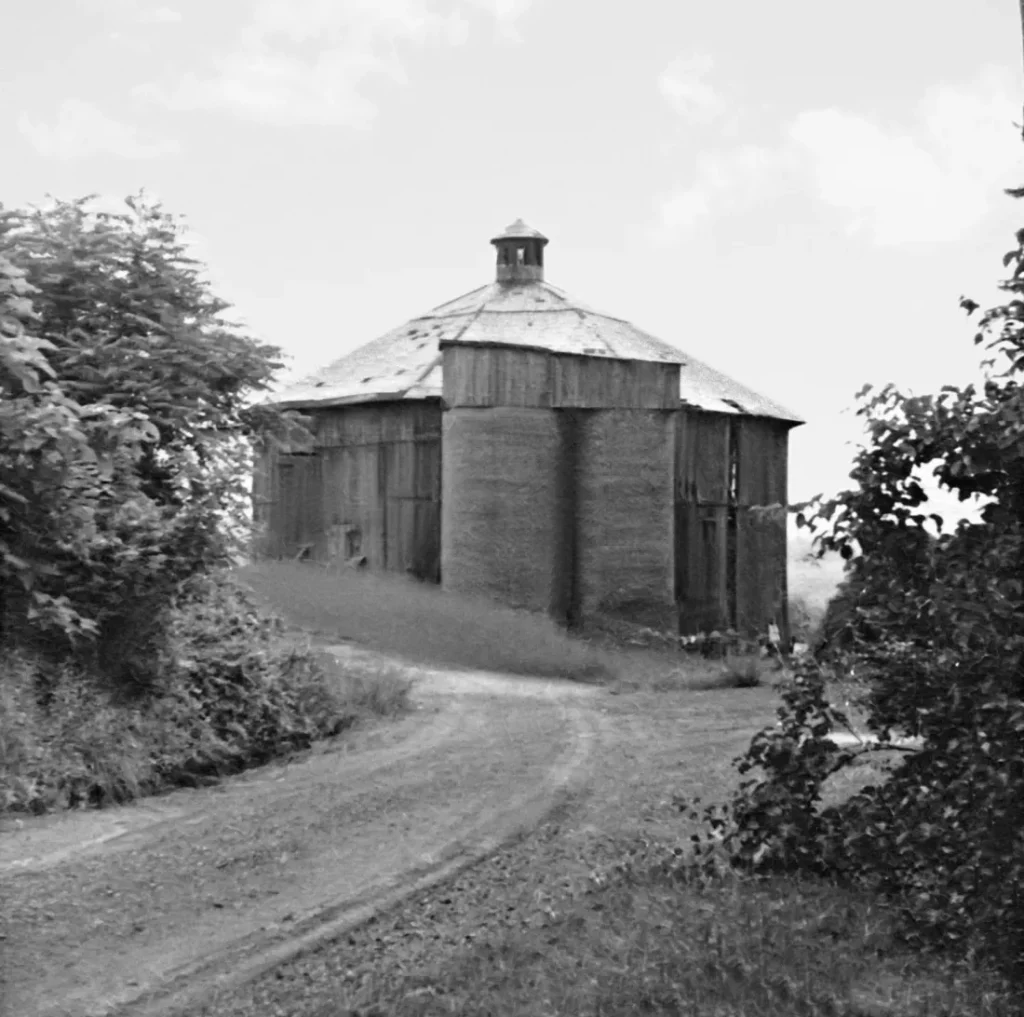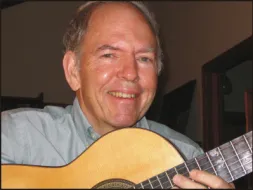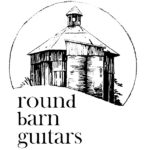Why the Round Barn name?
That’s easy enough to explain because in 1893 my maternal grandfather built a barn for his father. Grandpa Jimmy was a carpenter and the third generation of a German family (Oesterling) that had settled in western Pennsylvania in the 1830s. The barn he built was octagonal and the main floor was completely open all the way up to the slate roof. It was quite an engineering accomplishment to say the least and a great place to play as a young boy.
Roughly 100 years later, my wife and I moved ‘back to the farm’ from our home in central Ohio and we built a home where the round barn had once stood. One room in our house, my office/guest room, incorporates the original brick foundation of one of the silos of the barn. I often think of Grandpa Jimmy and how he aspired to build a unique structure for his father. Perhaps my love of lutherie was inherited from his passion for carpentry and building. It’s very appropriate to include his accomplishment in the name for this endeavor. And just so I don’t slight the other side of the family, my paternal grandfather was quite an artist.

About Me
 My life has been on a collision course to become a luthier since I began playing the guitar in college. I just didn’t realize it until 50 years had passed. I was playing golf with a good friend and I mentioned to him that I thought it would be challenging fun to build a guitar. He replied that he wouldn’t be surprised if I ended up building more than one. Turns out he was absolutely right.
My life has been on a collision course to become a luthier since I began playing the guitar in college. I just didn’t realize it until 50 years had passed. I was playing golf with a good friend and I mentioned to him that I thought it would be challenging fun to build a guitar. He replied that he wouldn’t be surprised if I ended up building more than one. Turns out he was absolutely right.
I quickly fell in love with the challenge of the craft and the joy of working with wood and watching it become a beautiful instrument. It only took trying to find the best methods relying on books, CDs, and the internet for five guitars that I accepted the fact that I needed the guidance of a highly qualified expert.
 Back to the internet and I found Brian Burns. I studied his website (www.lessonsinlutherie.com) and was intrigued by his application of science to the art of lutherie. It was obvious to me that Brian was a master luthier and that if he was willing to teach me, that I would finally be learning the skills I needed to build truly quality guitars.
Back to the internet and I found Brian Burns. I studied his website (www.lessonsinlutherie.com) and was intrigued by his application of science to the art of lutherie. It was obvious to me that Brian was a master luthier and that if he was willing to teach me, that I would finally be learning the skills I needed to build truly quality guitars.
Brian was willing to take a chance on me as a student. He is a good friend and still a mentor after more than six years of working together. Thanks to Brian’s exceptional teaching ability, I am now on classical guitar build number 21 and have built a flamenco as well. Burns classical and flamenco guitars are being used by some of the finest musicians in the country.
My garage production shop has steadily evolved and has finally forced me to part with my beloved but seldom driven 2004 Ford Ranger to generate some more work space. That will allow me to better build more guitars — primarily classicals but also flamencos and the occasional steel string. My objective is to have these instruments become prized possessions of guitarists who will love them as I do.
About Our Guitars
Today’s prices for nylon string classical guitars range from $3 – 4,000 for the better factory models to five figures and above for hand-crafted instruments made by luthiers who have built a reputation among the playing community. Since Round Barn Guitars does not currently fall into either of these categories, we’re obviously in the middle of those ranges at $5 – $6,000 for those instruments that are ready to find new homes.
We’re also looking at new models. We have built a TQ (“Three Quarter”) model for those looking for a smaller instrument, whether for travel or for a younger person who isn’t ready to handle a standard sized guitar.
Our newest model is the 875, which is 7/8 of the standard size, just between the TQ and the standard size. Watch our blog for developments as the first 875 is taking shape. Like the first TQ, this first 875 is going to be “full dress” which means it will have a first quality spruce top along with a custom rosette and purfling and binding. As we interact with customers, we may offer less decorative models of both the TQ and the 875.
We build just a few instruments each year and usually they are what happen to interest us most at the time. We would be happy to take custom orders. Naturally, a deposit would be required upon agreement of production details. This is to protect the buyer’s promised production schedule and also Round Barn Guitars expenses for any raw materials needed.
We have always hoped we could play a special role for guitar students. We understand that finances can be a special problem and we want to help make it possible for students to own a truly quality guitar as they are learning this wonderful craft. Contact us, let us know where you are studying and with whom, and we hope we can help you get your first dream guitar.
